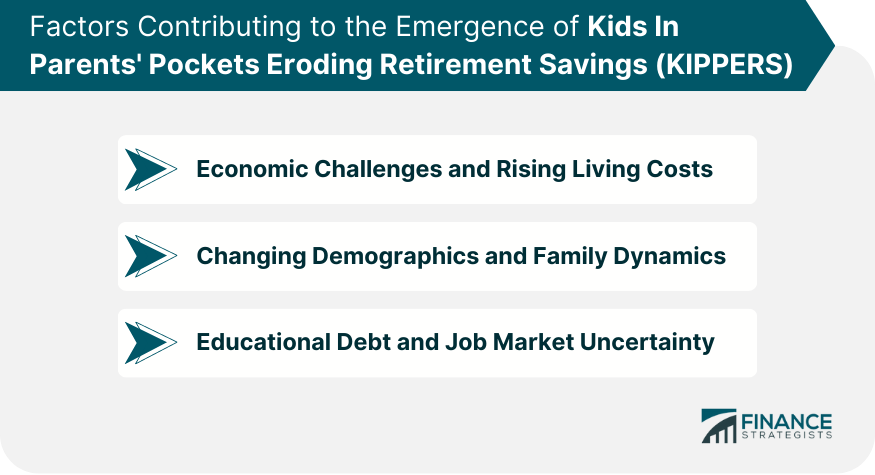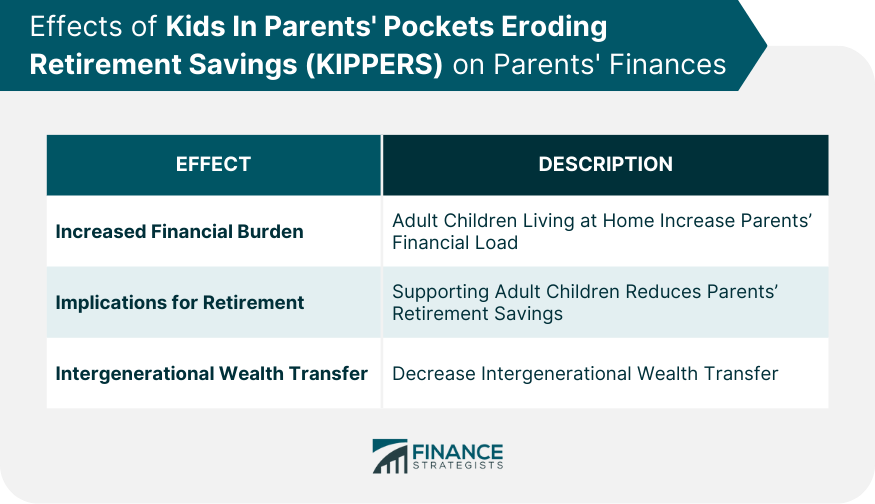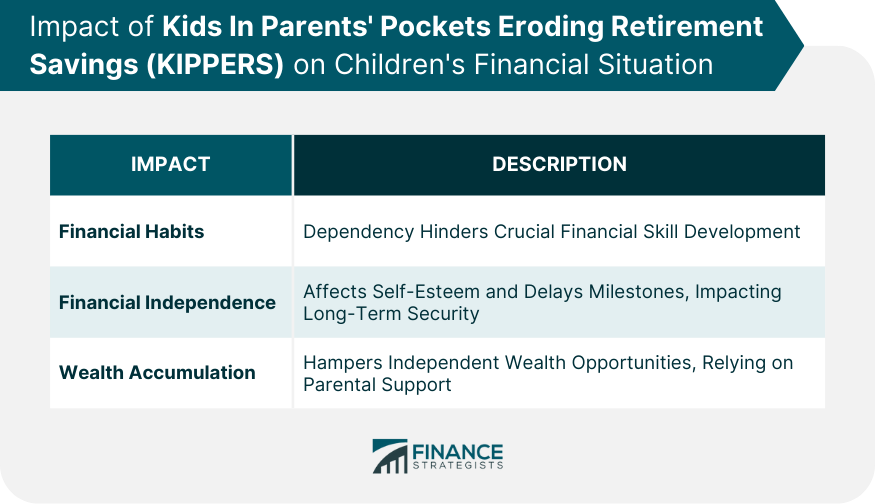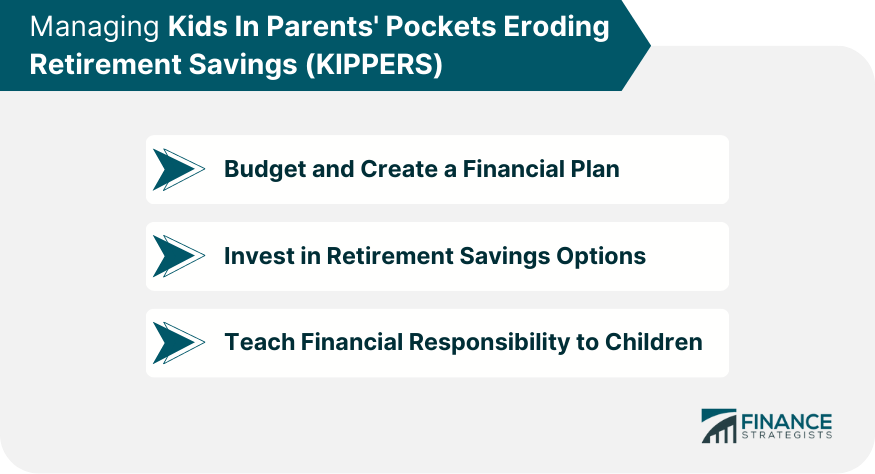The term KIPPERS, an acronym for Kids In Parents' Pockets Eroding Retirement Savings, refers to a socio-economic phenomenon of adult children living with their parents due to financial constraints, thereby impacting their parents' retirement savings. It's a trend that has become increasingly prevalent in many developed countries, particularly in the face of economic challenges and changes in societal norms. It is a growing financial phenomenon where adult children rely on their parents for financial support, eroding their retirement savings. This trend poses significant challenges for both parents and children, impacting long-term financial security and independence. The KIPPERS phenomenon isn't just a familial issue, but it also has far-reaching implications for society and the economy at large. KIPPERS usually involves young adults who, due to various circumstances such as unemployment, low wages, high living costs, or significant student debt, find themselves unable to live independently and hence continue to live with their parents. This situation often leads to parents bearing their adult children's living expenses, thereby depleting their retirement savings or diverting funds initially intended for retirement. Similarly, it tends to delay parents' retirement or impact the quality of life during retirement. As the cost of housing, education, and general living expenses increases, many young adults find it challenging to maintain an independent lifestyle. This economic pressure has resulted in a delay in traditional markers of adulthood, including moving out of the parental home. Societal changes in family structure and demographics also contribute to the KIPPERS phenomenon. The increasing acceptance of adult children living at home, coupled with later marriage ages and smaller families, makes staying at home a more feasible and less stigmatized option for many young adults. In the modern world, higher education often comes with significant debt, while the job market continues to be unpredictable. The pressure of student loan debt and the insecurity of employment make living independently a financial strain for many young adults, contributing to the rise of the KIPPERS phenomenon. When adult children remain at home, it can increase the financial burden on their parents. From daily living expenses to higher costs such as health insurance and car payments, parents may find themselves shouldering significant financial responsibilities. The financial support provided to adult children living at home can have significant implications for parents' retirement savings. Money that could have been invested for retirement is instead being used to support the adult child, leading to reduced retirement savings and potentially affecting the quality of parents' retirement. The KIPPERS trend can potentially affect the intergenerational transfer of wealth. As parents spend more on supporting their adult children, they may have less to leave as an inheritance. This change could affect future generations' wealth and economic stability. Remaining financially dependent on their parents can impact a young adult's financial habits. By not taking full financial responsibility, they may not develop essential financial management skills, which are crucial for their future financial independence. It can impact a person's self-esteem and delay other life milestones, such as marriage or home ownership. In the long term, it may also affect their financial security and wealth accumulation. For children affected by the KIPPERS phenomenon, their financial dependence on their parents might hinder their ability to accumulate wealth independently. By relying on parental support, they may miss opportunities to save, invest, or acquire assets that contribute to long-term financial growth. Parents may need to reassess their financial plans and budgets to accommodate the costs associated with adult children living at home. Creating a comprehensive budget can help parents understand their financial limitations and make necessary adjustments to their spending patterns. Despite the financial pressures of the KIPPERS situation, it's essential for parents not to neglect their retirement savings. This might involve exploring various investment options or seeking advice from a financial advisor to ensure they remain on track to achieve their retirement goals. One crucial aspect of managing the KIPPERS situation involves teaching financial responsibility and independence to children. This education can equip them with the skills needed to manage their finances effectively, ultimately aiding them in achieving financial independence. This might involve teaching them about budgeting, saving, investing, and the cost of living. The KIPPERS phenomenon, where adult children rely on their parent's financial support, poses significant challenges for both families and society. Economic challenges, changing demographics, and student debt contribute to its prevalence. For parents, supporting adult children can strain finances and impact retirement savings, potentially affecting intergenerational wealth transfer. Meanwhile, adult children may face delayed financial independence and lack crucial financial management skills. Managing KIPPERS requires budgeting, financial planning, and investment strategies to balance parental support and retirement savings. Equally crucial is teaching financial responsibility to children to promote their financial independence. As this trend continues to evolve, understanding and addressing the KIPPERS phenomenon will be vital to ensure financial stability and security for both parents and children in the future.What Is KIPPERS?
KIPPER Phenomenon
Factors Contributing to the Emergence of KIPPERS
Economic Challenges and Rising Living Costs
Changing Demographics and Family Dynamics
Educational Debt and Job Market Uncertainty

Effects of KIPPERS on Parents' Finances
Increased Financial Burden on Parents
Implications for Parents' Retirement Savings
Intergenerational Wealth Transfer

Impact on Children's Financial Situation
Financial Habits
Financial Independence
Wealth Accumulation

Managing KIPPERS
Budget and Create a Financial Plan
Invest in Retirement Savings Options
Teach Financial Responsibility to Children

Conclusion
KIPPERS | Kids In Parents' Pockets Eroding Retirement Savings FAQs
KIPPERS, an acronym for Kids In Parents' Pockets Eroding Retirement Savings, is a trend of adult children living with their parents due to financial constraints, impacting parents' retirement savings.
Factors contributing to the KIPPERS trend include economic challenges, rising living costs, societal changes, educational debt, and uncertainties in the job market.
KIPPERS can increase the financial burden on parents, deplete their retirement savings, and potentially affect the intergenerational transfer of wealth.
KIPPERS can negatively impact children's financial habits, delay their financial independence, and can even impact their long-term financial security and wealth accumulation.
The KIPPERS situation can be managed through robust budgeting and financial planning strategies, investing for retirement, and teaching financial responsibility and independence to children.
True Tamplin is a published author, public speaker, CEO of UpDigital, and founder of Finance Strategists.
True is a Certified Educator in Personal Finance (CEPF®), author of The Handy Financial Ratios Guide, a member of the Society for Advancing Business Editing and Writing, contributes to his financial education site, Finance Strategists, and has spoken to various financial communities such as the CFA Institute, as well as university students like his Alma mater, Biola University, where he received a bachelor of science in business and data analytics.
To learn more about True, visit his personal website or view his author profiles on Amazon, Nasdaq and Forbes.











